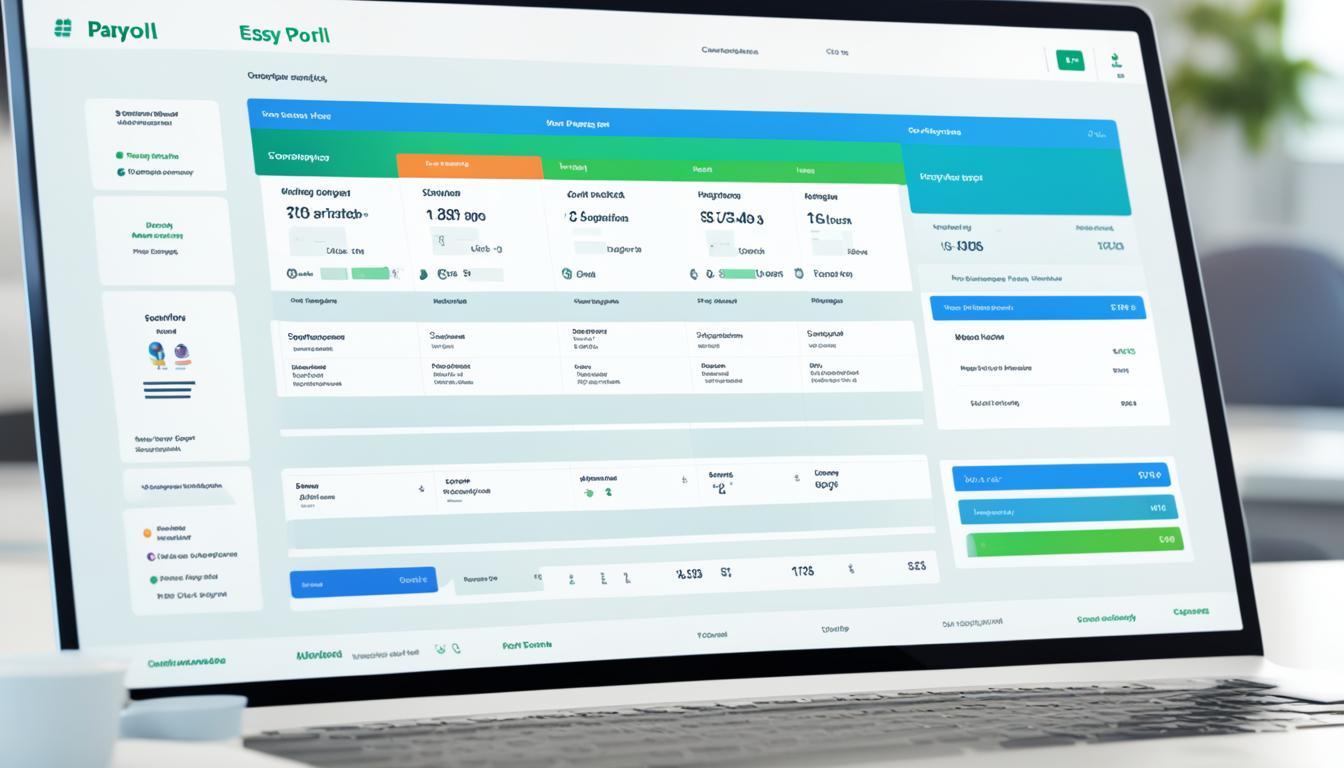Welcome to our article on B2B software, also known as business-2-business software. If you’re wondering what B2B software is all about and how it can benefit your business, you’ve come to the right place. In this article, we’ll dive into the world of B2B software, exploring what it is, its key features, and how it can help streamline your operations and boost efficiency.
B2B software refers to cloud-based software solutions that are specifically designed for businesses. These software tools serve a wide range of purposes, from project management and team collaboration to customer relationship management and digital marketing. B2B software solutions are created to address the unique needs and challenges faced by businesses, aiming to enhance productivity, improve processes, and drive growth.
When it comes to business software, the options are vast and varied. From enterprise-level software solutions to specialized tools for specific industries, B2B software development continues to evolve, offering businesses innovative solutions to stay ahead in today’s competitive landscape.
In the next sections of this article, we’ll explore the difference between B2B and B2C software, the advantages of using B2B software products, effective marketing strategies for B2B SaaS companies, notable B2B SaaS companies in the world, and the significance and challenges of B2B e-commerce. So, let’s dive in!
B2B Software vs. B2C Software
When it comes to software solutions, one size does not fit all. B2B software, designed for businesses, offers tailored features to address the unique pain points and challenges faced by business customers. On the other hand, B2C software is geared towards individual customers, aiming to meet their personal needs and interests.
The distinction between B2B and B2C software lies in their target audience and functionality. B2B software focuses on streamlining business operations, enhancing productivity, and driving efficiency. It offers advanced features and customization options that cater specifically to the requirements of business customers.
In contrast, B2C software caters to the preferences of individual customers. It tends to be more consumer-oriented, offering solutions for entertainment, personal finance, health, and various other areas that cater to individual needs and interests.
While there may be some overlap between B2B and B2C software, with certain software solutions serving both business and individual customers, the core focus and functionality remain distinct. B2B software primarily serves the needs of businesses, helping them optimize their operations, while B2C software targets individual consumers seeking solutions that align with their personal preferences.
Comparing B2B and B2C Software Features
Here’s a closer look at the key differences in features between B2B and B2C software:
| B2B Software | B2C Software |
|---|---|
| Advanced customization options tailored to business needs | User-friendly interface for easy individual use |
| Robust data security and privacy features | Focus on convenience and ease of use |
| Integration capabilities with other business software | Integration with consumer devices and platforms |
| Collaboration tools for team communication and project management | Entertainment and leisure-oriented features |
As the table illustrates, B2B software prioritizes business-specific functionalities such as advanced customization, data security, and seamless integration with other software tools. B2C software, on the other hand, emphasizes user-friendliness, convenience, and entertainment-oriented features.
While both B2B and B2C software play important roles in meeting customer needs, it is crucial to choose the right software solution based on the target audience – businesses or individual consumers.
Advantages of B2B Software Products
B2B software products offer numerous advantages for your business. Here are some key reasons why incorporating B2B software into your operations can be highly beneficial:
Easily Accessible Cloud-Based Software
B2B software operates on cloud-based platforms, allowing your teams to access the tools from anywhere and at any time. Whether your employees are working remotely or collaborating across different locations, cloud-based software ensures seamless accessibility and real-time updates. This flexibility enhances productivity and promotes efficient teamwork.
Simpler Upgrades and Feature Additions
With B2B software, you can easily upgrade and incorporate new features into your system as your business grows or industry requirements evolve. Unlike traditional software solutions, B2B software allows for seamless updates, eliminating the need for complex installation processes or disruptions to your operations. This ensures that your business always has access to the latest capabilities and features to stay ahead.
Cost Reduction with Predictable Budgeting
One of the major advantages of B2B software is the cost predictability it offers. Instead of hefty upfront costs associated with purchasing traditional software licenses, B2B software operates on a subscription-based model. This allows you to budget for predictable monthly or annual subscription fees, reducing upfront investment expenses. This cost-effective approach enables businesses of all sizes to access advanced software solutions without straining their budgets.
Efficient Customer Support
B2B software providers understand the importance of efficient customer support for your business. They are dedicated to ensuring that any issues or concerns you encounter are resolved promptly. Reliable customer support teams are available to provide assistance, answer your questions, and troubleshoot any technical difficulties you may encounter with the software. This ensures minimal disruptions to your operations and helps your business stay on track.
Overall, integrating B2B software into your business infrastructure offers a range of advantages. From easy accessibility and simplified upgrades to cost reductions and efficient customer support, B2B software empowers your business to operate more effectively and efficiently.
B2B SaaS Marketing Strategies
When it comes to B2B SaaS marketing, traditional B2C strategies just won’t cut it. You need a tailored approach that speaks directly to your target audience and highlights the unique benefits of your software solutions. Here are four effective strategies to help you promote your B2B SaaS products:
1. Search Engine Optimization (SEO)
Boost your website’s visibility and organic traffic through strategic SEO techniques. By optimizing your website’s content with relevant keywords and improving its overall structure, you can increase your search engine rankings and attract potential customers who are actively searching for the solutions you offer.
2. Paid Ads
Utilize paid advertising platforms like Google Display and Facebook ads to reach your target audience directly. These platforms allow you to create highly targeted campaigns that showcase your B2B SaaS products to the right people at the right time, increasing brand awareness and driving qualified leads to your website.
3. Email Marketing
Nurture leads and build strong relationships with your audience through email marketing. Create valuable content that addresses their pain points, offers solutions, and showcases the benefits of your B2B SaaS products. By providing relevant information and answering their questions, you can establish trust and credibility, ultimately increasing conversion rates.
4. Social Media Marketing
Engage with your target audience on social media platforms like LinkedIn, Twitter, and Instagram. Share industry insights, success stories, and product updates to establish your brand as an authority in the B2B SaaS market. Actively interact with your followers, respond to their comments and messages, and foster an online community that promotes your brand and drives customer loyalty.
Remember, each B2B SaaS marketing strategy should be tailored to your specific target audience and business goals. Experiment with different tactics, track your results, and continuously refine your approach to achieve optimal success.
By implementing these proven strategies, you can effectively promote your B2B SaaS products, attract quality leads, and drive significant growth for your business. Stay ahead of the competition and maximize your reach in the B2B market.
| Strategy | Description |
|---|---|
| Search Engine Optimization (SEO) | Optimize your website to improve search engine rankings and increase organic traffic. |
| Paid Ads | Utilize platforms like Google Display and Facebook ads to reach your target audience through targeted campaigns. |
| Email Marketing | Nurture leads and build relationships through valuable content and personalized email campaigns. |
| Social Media Marketing | Engage with your audience on social media platforms, establish brand authority, and drive customer loyalty. |
Top 16 B2B SaaS Companies in the World
When it comes to B2B SaaS companies, there are several industry leaders that have made a significant impact in the market. These companies offer innovative software solutions tailored to the needs of businesses. Let’s take a look at some of the top B2B SaaS companies:
- Google: Google is known for its wide range of productivity tools under Google Workspace, enabling businesses to collaborate and streamline their operations.
- HubSpot: HubSpot specializes in marketing and sales software, helping businesses attract, engage, and delight customers throughout their buyer’s journey.
- Slack: Slack is a popular communication tool used by businesses worldwide to enhance team collaboration and streamline internal communications.
- Xero: Xero offers a cloud-based accounting system, allowing businesses to manage their finances efficiently and have real-time insights into their financial performance.
- Atlassian: Atlassian provides project management and software tools, empowering teams to plan, track, and collaborate on projects effectively.
- Salesforce: Salesforce is a leading CRM platform that helps businesses manage customer relationships, sales pipelines, and marketing campaigns.
- Trello: Trello offers a visual project management tool that enables businesses to organize tasks, track progress, and collaborate seamlessly.
- Zendesk: Zendesk provides customer support software, empowering businesses to deliver exceptional customer service and support across various channels.
- Adobe: Adobe offers a range of creative and marketing software solutions, enabling businesses to create and deliver engaging content and campaigns.
- Microsoft: Microsoft provides a comprehensive suite of business software, including productivity tools, collaboration platforms, and cloud services.
- Oracle: Oracle offers a wide range of enterprise software solutions, including database management systems, business intelligence tools, and cloud applications.
- SAP: SAP is a global leader in enterprise application software, offering businesses solutions for finance, human resources, supply chain, and more.
- Zoom: Zoom is a video conferencing and collaboration platform that has gained immense popularity, especially in the wake of remote work and virtual meetings.
- Shopify: Shopify is an e-commerce platform that allows businesses to create online stores and sell products, enabling seamless B2B and B2C transactions.
- Dropbox: Dropbox offers cloud storage and file sharing solutions, allowing businesses to store, access, and collaborate on important files and documents.
- Airtable: Airtable provides a flexible and collaborative platform for organizing and managing projects, tasks, and data, tailored to the needs of businesses.
These top B2B SaaS companies have revolutionized the way businesses operate and have become trusted partners for companies across various industries. Their software solutions empower businesses to enhance productivity, streamline processes, and accelerate growth.
Image source: https://seowriting.ai/32_6.png
What is B2B E-commerce?
B2B e-commerce refers to the electronic transaction of products, services, or information between businesses. It commonly occurs in the supply chain, where one business purchases raw materials or products from another. B2B e-commerce can take place through various platforms, including company websites, product supply and procurement exchanges, specialized industry portals, and brokering sites. These platforms facilitate B2B transactions and provide businesses with convenient ways to connect with suppliers and customers.
B2B e-commerce plays a crucial role in streamlining the supply chain and enabling efficient business operations. It allows businesses to easily source necessary products and materials from qualified suppliers, ensuring a smooth flow of goods and services. With the advent of online platforms, the process of buying and selling in the B2B sector has become more accessible and efficient.
Online product exchanges and marketplaces enable businesses to reach a wider network of potential customers and suppliers. The transactional nature of B2B e-commerce allows businesses to negotiate prices, agree on terms, and complete transactions online, reducing the need for time-consuming manual processes.
By embracing B2B e-commerce, businesses can enhance their efficiency, streamline their supply chain, and benefit from increased access to a global network of suppliers.
The Benefits of B2B E-commerce
B2B e-commerce offers several benefits for businesses:
- Increased convenience: Online platforms provide businesses with 24/7 access to products and suppliers, allowing for flexible purchasing and sourcing.
- Reduced costs: B2B e-commerce eliminates the need for physical retail spaces and reduces manual paperwork, leading to cost savings for businesses.
- Efficient supply chain management: B2B e-commerce platforms enable businesses to manage their supply chain more effectively, ensuring timely delivery of goods and services.
- Global reach: With B2B e-commerce, businesses can easily expand their reach beyond local markets and connect with suppliers and customers from around the world.
The Challenges of B2B E-commerce
While B2B e-commerce offers valuable advantages, it also presents challenges that businesses need to address:
- Security concerns: B2B transactions involve sensitive business information, making security a top priority. Businesses must implement robust security measures to protect their data.
- Complexity of integration: Integrating B2B e-commerce platforms with existing systems and processes can be complex and require careful planning and execution.
- Logistics and fulfillment: Managing the logistics and fulfillment of B2B orders can be challenging, especially when dealing with large volumes or international shipments.
- Building trust: Establishing trust among business customers is crucial for successful B2B e-commerce. Businesses must showcase their reliability and credibility to attract and retain customers.
Despite these challenges, the benefits of B2B e-commerce outweigh the drawbacks for many businesses. By leveraging online product exchanges and embracing digital transactions, businesses can enhance their efficiency, streamline their supply chain, and benefit from increased access to a global network of suppliers.
Importance of B2B Transactions
B2B transactions play a vital role in the smooth functioning of businesses. These transactions involve the purchase of products and services that are essential for the day-to-day operations of a company. Whether it’s office space, furniture, or computer hardware and software, businesses rely on B2B suppliers to meet their needs and support their operations.
By engaging in B2B transactions, businesses ensure a steady supply of necessary resources, allowing them to focus on their core competencies. These transactions enable businesses to acquire the products and services they need to function effectively, without the need for extensive in-house operations.
Furthermore, B2B transactions foster strong client relationships. By sourcing products and services from trusted suppliers, businesses can build a network of reliable partners. These relationships contribute to the long-term success of a company by providing reliable and high-quality resources.
Building strong client relationships through B2B transactions is a two-way street. Suppliers also benefit from these transactions by establishing themselves as trusted providers in the market. By consistently delivering quality products and services, suppliers can secure repeat business and expand their customer base.
In summary, B2B transactions are of utmost importance for businesses. They not only ensure the smooth functioning of day-to-day operations but also contribute to the development of strong client relationships. Without B2B transactions, businesses would struggle to acquire the necessary resources to launch, operate, and grow.
Benefits of B2B Transactions:
- Streamlined procurement process
- Access to a wide range of products and services
- Enhanced operational efficiency
- Establishment of strong client relationships
- Improved cost-effectiveness
Challenges of B2B Transactions:
- Negotiating favorable terms and pricing
- Ensuring timely delivery of products and services
- Managing complex supply chains
- Maintaining quality control
Despite the challenges, the benefits of engaging in B2B transactions far outweigh the potential drawbacks. Businesses can leverage these transactions to optimize their operations, establish fruitful partnerships, and drive sustainable growth.
“B2B transactions are the lifeblood of businesses, providing the necessary resources and building strong client relationships.”
Benefits and Challenges of B2B E-commerce
B2B e-commerce offers numerous benefits for businesses, allowing them to engage in large average deal sizes and generate substantial sales and revenue. The ability to conduct transactions of significant value enables businesses to expand their customer base and drive growth.
Benefits of B2B E-commerce:
- Large Average Deal Sizes: B2B e-commerce enables businesses to negotiate and complete transactions with higher average deal sizes. This translates to increased revenue and profitability.
- Customer Retention: B2B transactions often involve businesses that exhibit loyalty and long-term partnerships. This loyalty can lead to higher customer retention rates, ensuring a stable and consistent revenue stream.
While B2B e-commerce offers several advantages, it also comes with its fair share of challenges that businesses must navigate:
- Long-Term Customer Retention Strategies: Maintaining customer loyalty in the competitive B2B market can be challenging. Businesses need to develop effective strategies to keep customers engaged and satisfied over the long term.
- Competitive Market: B2B e-commerce is a highly competitive landscape, with businesses vying for market share. Standing out among competitors requires effective marketing, exceptional customer service, and innovative solutions.
- Price Negotiations: B2B transactions often involve complex price negotiations. Businesses must be skilled at finding mutually beneficial pricing agreements while ensuring profitability.
- Supply Chain Management: B2B e-commerce involves managing complex supply chains, coordinating orders, inventory, and fulfillment. Efficient supply chain management is crucial to ensuring smooth operations and customer satisfaction.
Overcoming these challenges requires a strategic approach to B2B e-commerce, focusing on building strong relationships with customers, offering unique value propositions, and continuously adapting to the dynamic market.
Conclusion
In summary, B2B software is an essential tool for businesses, providing them with the means to streamline operations and boost efficiency. Its benefits are numerous and diverse, ranging from easy accessibility to cost predictability and simplified upgrades. With B2B software, businesses can experience seamless collaboration and improved productivity.
Implementing effective B2B software marketing strategies is crucial to reach the target audience successfully. Tailored approaches such as SEO, paid ads, email marketing, and social media marketing enable companies to promote their software solutions effectively and attract potential customers.
Leading the market, there are several top B2B SaaS companies like Google, HubSpot, Slack, Xero, Atlassian, and Salesforce, known for their innovative and reliable software solutions. These companies have established themselves as industry leaders and continue to provide exemplary services to businesses across various sectors.
While B2B e-commerce presents both benefits and challenges, it remains an integral part of business transactions. It facilitates the exchange of products, services, and information between businesses, supporting smooth supply chains and fostering strong client relationships. B2B e-commerce contributes significantly to the overall success of companies in diverse industries.
FAQ
What is B2B software?
B2B software refers to cloud-based software solutions sold by one business to another, designed to streamline operations and improve efficiency.
What is the difference between B2B software and B2C software?
B2B software is targeted towards businesses, solving their pain points and helping them operate effectively. B2C software caters to individual customers’ personal needs.
What are the advantages of B2B software products?
B2B software offers easy access, cost predictability, simplified upgrades, and efficient customer support.
What are effective strategies for B2B SaaS marketing?
Effective strategies include SEO, paid ads, email marketing, and social media marketing to promote B2B software solutions and attract potential customers.
Which are the top B2B SaaS companies in the world?
Some of the top B2B SaaS companies include Google, HubSpot, Slack, Xero, Atlassian, and Salesforce.
What is B2B e-commerce?
B2B e-commerce refers to the electronic transaction of products, services, or information between businesses, commonly occurring in the supply chain.
Why are B2B transactions important?
B2B transactions are essential for businesses as they involve the purchase of products and services necessary for their operations, supporting the smooth functioning of a company.
What are the benefits and challenges of B2B e-commerce?
B2B e-commerce offers benefits such as large average deal sizes and higher customer retention, but also comes with challenges like long-term customer retention strategies and competitive markets.








